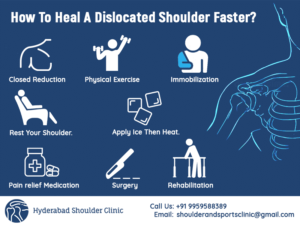A rotator cuff is a collection of muscles and ligaments located around your shoulder joint. It prevents your upper arm bone from shifting out of the shallow socket of the shoulder. A rotator cuff tear is said to be a tear in any of the muscles and tendon groups that help ensure the stability of your shoulder joint and allow your arm to lift and rotate (your rotator cuff).
Rotator cuff tears can be of two types. A partial tear – occurs when one of your rotator cuff muscles is strained or torn. The other one is a complete tear – it occurs when the tendon or ligament completely pulls out of the bone.
Rotator cuff injuries are common, and as you age, the risk of injuries also increases. People like painters & carpenters whose jobs require repetitive overhead motions may experience rotator cuff tear at an early age.
Most people with rotator cuff tears manage their symptoms with the help of physical therapy exercises designed to improve your shoulder flexibility and strengthen your muscles around the shoulder joints.

An injury to the rotator cuff can sometimes cause a tear. In such cases, some diagnostic tests should be performed as soon as possible to design a treatment that may include surgery. If the tear is extensive, alternative tendons may be transferred, or it may be necessary to replace the shoulder joint.
When should I consult a doctor for a rotator cuff tear?
Consult an expert shoulder doctor if you observe any of the following signs. Over time, you can get more severe problems if you do nothing about your torn rotator cuff. In some cases, it may develop into frozen shoulders or arthritis, which is more difficult to treat.
- Feeling stiff when you raise your arm
- Pain when you move your affected arm in a specific direction or when you lie down on it
- A feeling of weakness in your shoulder
- Unable to lift objects as you usually do
- If you hear clicking or popping sound when moving your arm
Rotator Cuff Tear Causes and Risk Factors
Rotator cuff tear happens in two different ways: either due to a shoulder injury or the tendon wears down over time. If the rotator cuff tears happen due to wear and tear action, it is called a degenerative tear.
Following are the risk factors that can cause rotator cuff tears:
- Occupation – You are more likely to have rotator cuff tears if you are in jobs like painting and construction.
- Lack of blood supply – As you get older, the blood supply to your rotator cuff decreases. This makes smaller tears become larger tears when they are difficult to repair.
- Bone spurs – Overgrowth of bone in your shoulder, which is more common as you age, can wear away the tissues of the rotator cuff and eventually cause tears.
- Age – People over the age of 60 tend to suffer from rotator cuff tears more frequently.
- Family history – Researchers believe that rotator cuff tears may be due to a genetic component. Some families are more likely to experience rotator cuff tears because someone in their family has it.

- Athletics – people who play certain sports like baseball, cricket, tennis, rowing, volleyball and weightlifting are likely to experience rotator cuff tears because these sports stress the muscles in your rotator cuff.
A rotator cuff problem without treatment can result in permanent weakness and loss of motion and may lead to progressive joint degeneration. If you are suffering from shoulder pain for a long time, don’t neglect it. Consult an expert orthopaedic shoulder specialist immediately. For your shoulder pain treatment, Dr Chandra Sekhar, one of the best shoulder surgeons in Hyderabad is always available. He treated thousands of people with different types of shoulder problems. Call +91 99595 88389 to book an appointment.





